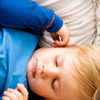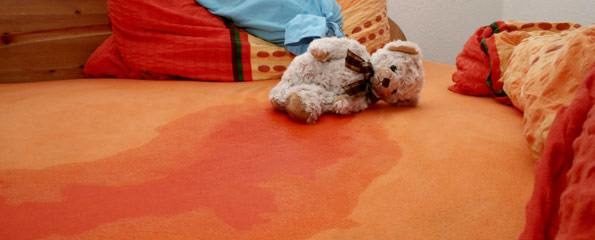Wetting the bed: When to worry and what to do
If your child wets the bed and you’re wondering whether you should worry or wait and see, you’re certainly not the first nor will you be the last parent to do so! Bed wetting is a common problem1 and most parents have been woken up at night to change wet sheets at least a few times. So when should you just grin and bear the interruption to a good night’s sleep, and when should you see a doctor? What can you do at home to help a child that wets the bed, and what should you not do?
When to worry about a child wetting the bed
If your child is over five and still wets the bed, they are not alone. One in five kids wet the bed after age five and one in ten does so after age ten.1
If your child is amongst those 1 in 5 that continue to wet the bed at 5 years old, the likelihood of the ‘wait and see’ approach working on its own is only 14% per year. In the hope that the problem will disappear on its own, only one-third of parents take their child to see the doctor about it.1
If their child isn’t amongst that 14% per year1 and the issue continues into adulthood, the problem is usually severe with nearly half of 19-year-old bed wetters still wetting the bed 7 nights per week.2
Bed wetting has a much more serious impact than just dealing with broken sleep and extra loads of laundry (although at an average laundering cost of $1,000 a year3 that’s nothing to sneeze at!). It causes a significant negative impact on the child’s self-esteem, creates tension amongst the whole family,4 and a bed wetting child tends to socially isolate themselves which is bad for their development.5
But GP Dr Simon Young says bed wetting is “a simple condition to treat”. And proper treatment for bed wetting is effective in the majority of cases.1
So from 5 years old, it’s time to take your child to the doctor, to work out what’s causing the bed wetting and what should be done to overcome it.6
What causes bed wetting?
There are numerous causes of bed wetting and all require different types of treatment.7 Most kids who experience bed wetting urinate normally during the day (e.g. they do not wet their pants at school), but have never managed to stay dry through the night for more than 6 months.7 This type of bed wetting is known as primary nocturnal enuresis.7 There are three possible causes, and in many children bed wetting is caused by a combination of two or more of these:8
- Difficulty waking up: Some kids are heavy sleepers and the urge to urinate is not enough to wake them;9
- Bladder instability: Also known as low functional bladder capacity. This is where the bladder gets full quickly and the child cannot hold on through the night.8 Dr Young says this is the cause of one in three cases of bed wetting; and
- Producing too much urine at night because of hormonal imbalance. Usually the brain produces more of a hormone called vasopressin at night and this hormone reduces the production of urine. According to Dr Young, about three in every five children who wet the bed do not produce enough vasopressin, so excessive urine is produced and this results in bed wetting.9
When a child who has previously gone for six months or longer without wetting the bed, but has started bed wetting again, they have a condition called secondary nocturnal enuresis.10 It is often accompanied with day time urination problems, for example the child might experience pain when urinating or wet their pants.7 These children often have another condition which affects their urination, for example a urinary tract infection, constipation or other difficulties with toileting during the day, emotional or family problems, developmental problems, diabetes,11 sexual abuse or upper airway obstruction.1
What not to do about bed wetting
Whether your child has primary or secondary bed wetting, it’s important to be aware that it is not their fault. Kids don’t want to wet the bed and they do not do it to be naughty. Bed wetting is a health problem and children that experience it can’t control their urination any more than a child with a cold or flu can stop their nose running.11 However research suggests that some parents punish children (particularly older children) for wetting the bed.12
Never blame a child or punish them for wetting the bed.11 Although bed wetting is stressful for you as a parent, it is not your child’s fault. Children who wet the bed often feel embarrassed and get teased by their peers.12 It can also make it harder for children to develop friendships13 and participate in social activities like sleep-overs.12 They need love and support, not more pressure, from their parents. Bed wetting can reduce a child’s self-esteem12 and being punished or blamed will only make this worse.5
The emotional impact of bed wetting gets worse if the problem persists into adolescence and adulthood. It may also negatively affect the development of intimate relationships and a career.12
 | For more information, see Impact of Bed Wetting. |
What to do about bed wetting
Talk to your child about bed wetting and let them know it is a common problem and one which can usually be overcome with the help of a doctor. Then go visit your doctor with your child.6 Unfortunately only about one in three Australian parents consult a doctor about their child’s bed wetting, although most children could be sleeping dry through the night with the help of doctor’s treatments.1
When bed wetting has a secondary cause (secondary nocturnal enuresis – they had previously not wet the bed for 6 months or more, but now do and may also have daytime urination problems10), treating the condition which is causing their bed wetting is the best strategy. For example, bed wetting may occur in children who have developed diabetes, and in this case treating and managing diabetes should be enough to resolve the bed wetting problem.1
If the child has primary nocturnal enuresis (they have never gone for 6 months without wetting the bed but urinate normally during the day7) introduce some simple techniques. Try restricting fluid before bedtime but ensure they are consuming adequate fluid during the day. But be aware that these strategies alone are unlikely to stop your child wetting the bed.6
Bed wetting alarms
When used properly, bed wetting alarms successfully treat two thirds of kids with primary nocturnal enuresis.14 There are two types of bed wetting alarms available in Australia. The first alarm type uses a large pad which is placed in the bed and triggers a loud alarm when liquid comes into contact with it. The second type attaches either directly to the child’s underpants or to a continence pad placed inside their underpants and is also triggered when liquid comes into contact with the sensor.1 The sound of the alarm helps the child to wake up and this eventually teaches them to rise when they need to urinate, even without the alarm.9 According to Dr Young, “Alarm therapy should continue for 2 to 3 months or until the child is dry for 14 consecutive nights, whichever comes first.”
Bed wetting medicines
Children who wet the bed because they produce too much urine at night may be offered treatment with a medicine called desmopressin (Minirin). Desmopressin is similar to vasopressin, the hormone produced naturally by the brain to reduce urine production. Desmopressin works the same way as the natural version – it reduces urine production.9 Your doctor will advise if this medication is suitable for your child.
Other bed wetting treatments
If none of these treat the problem, then another option is anticholinergic medication.15 It is usually combined with desmopressin therapy and can only be prescribed by a specialist.16 Tricyclic antidepressants may also be prescribed by a specialist only if all other avenues have failed first.15
Winning against bed wetting
Although it’s common, bed wetting is stressful and has negative emotional consequences for children and their families.12 Seeking help early (but after your child reaches 5 years) is the best strategy for ensuring your child gets the right treatment and bed wetting worries will be a thing of the past for your family.6 Not only will you have dry nights to look forward to, it’s likely that you’ll see your child’s self-esteem increasing and family life improving when there are no bed wetting worries.12
 | For more information about what causes bed wetting and how it can be treated, see Nocturnal Enuresis (Bed Wetting). |
References
- Caldwell PH, Edgar D, Hodson E, Craig JC. Bed wetting and toileting problems in children. Med J Aust. 2005;182(4):190-5. [Abstract | Full text]
- Yeung CK, Sreedhar B, Sihoe JD, et al. Differences in characteristics of nocturnal enuresis between children and adolescents: A critical appraisal from a large epidemiological study. BJU Int. 2006;97(5):1069-73. [Abstract | Full text]
- Hägglöf B, Andrén O, Bergström E, et al. Self-esteem before and after treatment in children with nocturnal enuresis and urinary incontinence. Scand J Urol Nephrol Suppl. 1997;183:79-82. [Abstract]
- Van Tijen NM, Messer AP, Namdar Z. Perceived stress of nocturnal enuresis in childhood. Br J Urol. 1998;81(Suppl 3):98-9. [Full text]
- Butler RJ, Redfern EJ, Forsythe WI. The child’s construing of nocturnal enuresis: a method of inquiry and prediction of outcome. J Child Psychol Psychiatry. 1990;31(3):447-54. [Abstract]
- NICE clinical guideline 111: Nocturnal enuresis: The management of bed wetting in children and young people [online]. London: National Institute for Health and Clinical Excellence; October 2010 [cited 15 November 2011]. Available from: [URL link]
- Nevéus T, von Gontard A, Hoebeke P, et al. The standardization of terminology of lower urinary tract function in children and adolescents: Report from the Standardisation Committee of the International Children’s Continence Society. J Urol. 2006;176(1):314-24. [Abstract | Full text]
- Bottomley G. Treating nocturnal enuresis in children in primary care. Practitioner. 2011;255(1741):23-6. [Abstract]
- Nevéus T. Nocturnal enuresis: Theoretic background and practical guidelines. Pediatr Nephrol. 2011;26(8):1207-14. [Abstract | Full text]
- Brown ML, Pope AW, Brown EJ. Treatment of primary nocturnal enuresis in children: A review. Child Care Health Dev. 2011;37(2):153-60. [Abstract]
- Nunes VD, O’Flynn N, Evans J, et al. Management of bed wetting in children and young people: Summary of NICE guidance. BMJ. 2010;(341):936-9. [Abstract]
- Schulpen TW. The burden of nocturnal enuresis. Acta Paediatr. 1997;86(9):981-4. [Abstract]
- Kuehhas FE, Djakovic N, Hohenfellner M. Infantile enuresis: Current state-of-the-art therapy and future trends. Rev Urol. 2011;13(1):1-5. [Abstract | Full text]
- Glazener CM, Evans JH, Peto RE. Alarm interventions for nocturnal enuresis in children. Cochrane Database Syst Rev. 2009:CD002911. [Abstract | Full text]
- Nevéus T, Eggert P, Evans J, et al. Evaluation of and treatment for monosymptomatic enuresis: A standardization document from the International Children’s Continence Society. J Urol. 2010;183(2):441-7. [Abstract | Full text]
- Friedman BC, Friedman B, Goldman RD. Oxybutynin for treatment of nocturnal enuresis in children. Can Fam Physician. 2011;57(5):559-61. [Abstract | Full text]
Dates
Tags
Created by:

 Login
Login














